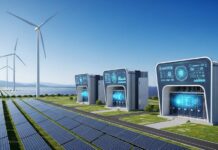The International Renewable Energy Agency (IRENA) and the International Hydropower Association (IHA) collaborate to tackle climate change.
In recognition of their shared objectives to increase the uptake of renewable energy, the International Renewable Energy Agency (IRENA) and the International Hydropower Association (IHA) have today signed a formal partnership agreement.
Hydropower is the world’s largest source of renewable energy, contributing over half of global renewable energy installed capacity, and directly employing around two million people.
The agreement sets out IRENA’s and IHA’s joint ambition to accelerate the development, financing and deployment of sustainable hydropower. This will involve future policy and market initiatives aimed at better rewarding hydropower for the clean storage and flexibility services it provides to the energy system. Cooperation will facilitate public-private dialogue, strengthen international cooperation and promote sustainable hydropower through the development and dissemination of knowledge.
Francesco La Camera, Director-General of IRENA, said: “IRENA’s Global Renewables Outlook estimates that an additional 850 GW of hydropower is required by 2050 for the world to stay on a climate-safe track in line with the Paris Agreement. There is therefore an urgent need to boost sustainable hydropower.”
“The Covid-19 crisis has shown beyond doubt the unique flexibility and resilience provided by hydropower compared with other energy sources”, he added. “IRENA has always considered hydropower an essential and central element of the renewables power mix.”
Recognising the important role of hydropower in the clean energy transition, IRENA’s recently published Post-COVID Recovery Agenda recommends a 150 per cent increase in sustainable hydropower investments from USD 22 billion to USD 55 billion per year to 2030 to support the recovery and accelerate the energy transition.
Eddie Rich, Chief Executive of IHA, said: “IRENA is the leading agency for the global advancement of renewable energy. We are delighted that it has recognised the essential role that sustainable hydropower will play to meet the climate change commitments set out in the Paris Agreement and Sustainable Development Goal (SDG) 7.”
“While hydropower will continue to play an essential role in global electricity, hydropower’s flexibility and storage capabilities are also important to complement variable renewables such as wind and solar. Hydropower acts as an enabler of higher shares of variable renewable energy in future energy systems,” he said.
Partnership activities will be focused on the development and sharing of knowledge, data and best practices. In addition, as part of the agreement, IRENA will join and play a leading role in IHA’s new International Forum on Pumped Storage Hydropower. Created in partnership with the U.S. Department of Energy, the forum is a government-led multi-stakeholder platform that aims to shape and enhance the role of pumped storage hydropower in future power systems. Pumped storage hydropower is a low-cost and mature, long-duration energy storage technology that represents over 90 per cent of the world’s grid-scale energy storage.
The partnership builds on another recent initiative by IRENA, the Collaborative Framework on Hydropower, supported by IHA, which aims to promote dialogue, co-operation and coordinated action among IRENA’s 161 member states. IHA is supporting the framework by leveraging knowledge and experience from initiatives such as:
- XFLEX HYDRO, an EU-funded initiative to demonstrate how innovative, flexible hydropower technologies can help countries meet their carbon reduction targets and support variable renewables.
- The Hydropower Sustainability Tools, a set of guidelines and assessment tools used by leading developers and operators to design and develop sustainable hydropower projects.
- IHA’s Hydropower Sector Climate Resilience Guide, which offers a methodology for identifying, assessing and managing climate risks to enhance hydropower’s resilience.
































